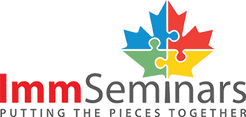Presenter/s: Lynn Gaudet B.A., LLB., RCIC
Date: 13 June 2023
Time: 11 am to 2:15 pm Pacific
Location: webinar
Type: webinar and recording
Price: $75.00
CPD approval:
- CICC 3 hours - 3 CPD hours approved, recording valid until 12 June 2024. Includes 3 hours of professionalism/Code of Professional Conduct.
- LSBC 3 hours - 3 CPD hours approved, video recording expires 31 December 2023 - attendance to this course will provide you with 45 minutes of ethics and professional responsibility component for your BC Law Society reporting.
- For Alberta lawyers, consider including this course as a CPD learning activity in your mandatory annual Continuing Professional Development Plan as required by the Law Society of Alberta.
This series focuses on the new RCIC Code of Professional Conduct and will appeal to both experienced RCICs as well as those starting out. A very practical “how-to” approach will be taken to help RCICs fulfil their professional duties to their clients and to the College. Some seminars span several Code sections to cover a wide-ranging topic like client service; others take a deep dive into one key section such as service agreements. All have a practical focus on common ethical pitfalls with examples, solutions and opportunities for participants to engage in resolving these issues with a view to operating your practice properly, and preventing client complaints.
Outline:
The immigration environment is very stressful these days for practitioners. We cannot control stresses from the IRCC’s constant program changes or the ongoing electronic platform issues. But we do have considerable control over our relationships with clients. Successful practitioners learn strategies to reduce the stresses caused by client conduct – this is essential not only for our emotional well-being, but also to prevent client complaints. This seminar offers practical ways to deal with difficult client behavior in immigration practice. After the main presentation, participants will be invited to share their own scenarios for discussion.
- Defensive practice: What it is, and why it’s key
- Managing stress in client relationships through strategies such as:
- More time in proper communication (and less time fixing things)
- Managing client expectations
- A payment system that rewards you fairly
- Enforcing the contract and professional boundaries
- Seven types of difficult client behavior and how to deal with each
- Optional termination under s 34: when to fire the client and how to it properly
- When the client discharges you – Sections 35 and 36
- Participant examples of stressful client relations: How to avoid, or handle?
- Professionalism
- Q & A
College of Citizenship and Immigration - Essential Competency mapping
RCIC
Professionalism
6.5 Recognizes and maintains professional boundaries in practice.
6.5.1 Recognizes warning signs of a potential and/or actual boundary crossing or violation.
Communication, Counselling and Advocacy
8.3 Uses communication and interpersonal skills to manage emotional situations.
8.3.1 Anticipates and proactively addresses potentially traumatic or emotionally difficult matters for the client.
8.3.4 De-escalates conflict through clarity, empathy, respectful communication, body language and active listening.
8.5 Manages client expectations through effective communications.
8.5.7 Reflects on and addresses client dissatisfaction in a timely manner to correct misunderstandings and de-escalates conflicts.
RSISA
Student Advising and Coaching
2.4 Uses effective coaching skills when interacting with the student.
2.4.11 Refers the student to the appropriate professional when the student's emotional needs are beyond the RISIAs competence and scope of practice.
Professionalism
5.2 Demonstrates accountability and integrity in professional behaviors and in practice.
5.2.6 Demonstrates transparent communications with students and other professionals.
5.5 Recognizes and maintains professional boundaries in practice.
5.5.1 Recognizes warning signs of a potential and/or actual boundary crossing or violation.
Communication and Education
7.3 Uses communication and interpersonal skills to manage emotional situations.
Speaker/s:
Lynn Gaudet B.A., LLB. RCIC
Lynn is a Regulated Canadian Immigration Consultant (RCIC) who operated her own business as a sole practitioner in Calgary, AB for 17 years from 2004-2021, is now semi-retired in Nanaimo, BC. Her practice areas spanned a broad spectrum of immigration and refugee applications with a focus on Permanent Resident applications and criminal inadmissibility issues. She also has decades of experience in adult education - teaching, writing and developing instructional materials such as the Immigration Practitioner’s Handbook published annually by Thomson Carswell Ltd. from 2006-2012.
Lynn is currently an Adjunct Professor in the Faculty of Law at Queens University teaching in the Graduate Program in Immigration and Citizenship Law [GDipICL]. She has taught the Ethics and Professional Responsibility Course for the Program since its inception and has also served as the Coordinating Instructor with responsibility for the curriculum.
She has a B.A. in Communications from Simon Fraser University and an LL.B. from the University of Victoria. She is a licensee in good standing of the College of Immigration and Citizenship Consultants (CICC) and a member of the Canadian Bar Association, National Immigration Section.
While speakers and topics are confirmed at the time of publication, sometimes things happen which are beyond the control of ImmSeminars. If that happens substitutions or cancellations to speaker/s and/or topic/s may be necessary. In those cases, ImmSeminars will advise all registrants by email as soon as possible. We will also update the Imm Seminars website. We appreciate your cooperation in these cases.






